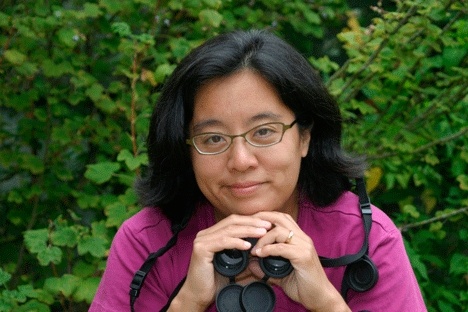It was Shakespeare who gave us a memorable theory on what’s in a name.
In the tragedy of “Romeo and Juliet,” Juliet claims that a rose by any other name would indeed smell as sweet. After all, she loves Romeo for the person he is, not for his name.
Author Carol Kaesuk Yoon would have had an excellent conversation with those ill-fated lovers had she been present on that inauspicious balcony in Shakespeare’s mind.
Yoon, a science writer for The New York Times and a biologist, considers the idea of naming living things in order to make sense of the world in her recently published book “Naming Nature: the Clash between Instinct and Science.”
Yoon would have understood the need for the young lovers to use whatever names they wished, as long as they could experience the world together. Like Juliet, who encourages Romeo to deny his father’s name, Yoon flys in the face of stodgy Old World science and encourages naming the world as we see it.
Looking beyond taxonomy (the practice and science of classification), Yoon takes readers beyond genus and species to deep cognition, revealing one’s drive to name life. She tells the strange story of scientists leading people away from the impulse to name the living world, even as they are driven by it.
“The book is basically about the unexpected discovery that all people have within them — what appears to be an innate desire — to order and name the living world,” Yoon said.
“One of my concerns is that people hardly order and name living things anymore, and I think that’s a large part of why so many people are so disconnected from the living world.”
Yoon said she thinks that’s a bad thing for two reasons.
First is that if people are not naming the world around them, then chances are they fail to notice what Yoon described as “all the amazing and wonderful things around us,” all the Romeos, roses, plants, insects and natural phenomena of the world, if you will.
Second, she said, is that if people remain so disconnected, they then may not be able to make choices about how they want the world to be.
“We are living in the midst of a mass extinction, yet most of us find it very difficult to even notice that, and as a result it’s hard both to care and to decide whether that’s really how we want things to be or not,” Yoon said.
“Naming Nature” is described as a book for people who love both words and nature. It was called a “sensuous delight” by O The Oprah Magazine and has received starred reviews in Publisher’s Weekly, Booklist and Kirkus Reviews.
Yoon takes readers on a journey from Linnaeus (the “father of taxonomy”), whose system turned classification from a hobby to a science, to Darwin, who ended the idea of rigid species definitions, to today’s dream of naming all of earth’s species and listing them online.
She reveals the reasons why it’s instinctual to care less about whether a whale is a fish or a mammal, but at the same time, why one cares deeply about the fact that whales exist and what they mean to the world.
The idea behind the book is to encourage readers to see the urgency of staying connected to the natural world by using familiar, rather than scientific, names.
Yoon said she sees her two young children do it all the time, and said children’s awareness of the world is just one of the many things that are so great about kids.
“They do bring us back, again and again, to the living world until we, or society somehow — usually around the age they hit puberty — manage to convince them that the living world isn’t so interesting after all,” she said.
As a scientist, Yoon aspires to revealing the beauty in biology and science, and in the living world.
“My feeling about it is that the living world is this absolutely amazing thing, right around us all the time,” she said.
“So many of us are, just by not noticing, missing out on all of it. Ordering and naming living things is a really easy and satisfying way to reconnect with the living world, and once you start doing it, it can be very addictive. And why wouldn’t it be, since it means you get to see beautiful, amazing, bizarre things around you; in your home, in your yard, on your way to work, every day.”
Originally from Massachusetts, the author now lives in Bellingham and credits the natural beauty of the Northwest with opening her eyes to a more detailed look at the natural world.
“I love the fact that a few years ago a cougar was spotted following the newspaper delivery guy down the street — and he was fine. I love going down to Whatcom Creek every year and seeing the salmon flopping their way upstream,” Yoon said.
“It is a really amazing place to live, and I do really think it’s had an influence on my writing. There are a million directions to go off into with any particular idea or project, and I’m really interested in the nitty gritty of science and the history of science, but I think it’s no coincidence that, since living here, I’ve ended up writing so much about the importance of seeing the beauty around you.”
The author will be at the Freeland Library from 1 to 2:30 p.m. Tuesday, Oct. 6 to talk about the book.
Yoon’s presentation promises to be enlightening, funny and engaging as she unfolds the scientists’ history of naming the natural world, and of her own surprising discoveries about the deep need of all mankind to name and order the natural world.
BookBay in Freeland will have copies of the book for sale at the presentation.


